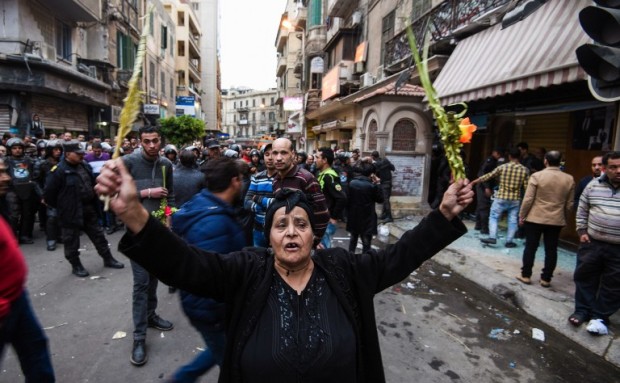
An Egyptian woman raises braided palm leaves, originally intended for Palm Sunday celebrations, during a gathering outside the Coptic Orthodox Patriarchate in Alexandria after a bomb blast struck outside while worshipers attended Palm Sunday mass on April 9, 2017. The Interior ministry said the suicide bomber was stopped by police outside and blew himself up. AFP
TANTA, Egypt — Coptic Christian worshippers in Egypt spoke of horrific scenes on Sunday after a bomb ripped through their church during a service, mangling bodies and destroying pews.
“There was a violent explosion near the altar,” Edmon Edward told AFP.
“Suddenly everything became black, people flew over each other,” he said.
READ: Church bombings in Egypt kill 37, wound dozens
He had been attending Palm Sunday mass at the Mar Girgis church in Tanta with his brother Emil, who stood with a white bandage wrapped around his head, when the attack claimed by the Islamic State (ISIS) group happened.
The explosion killed at least 27 people, and was followed hours later by a second bombing at a church in Alexandria, which killed 17.
At the church in Tanta, icons of Christ and St George looked down on a tangle of destroyed pews and congealing blood on the floor tiles.
“I head the blast, and then I saw a woman run barefoot with her face oozing blood,” said a taxi driver who asked not to be identified.
In hospital, a wounded witness told state television: “I just felt fire grabbing my face. I pushed my brother who was sitting next to me and then I heard people saying: ‘explosion’.”
READ: First Palm Sunday since ISIS in Iraq’s main Christian town
Nabil Nader, 65, who lives opposite the church, spoke of the attack’s aftermath and said the first three rows of pews in the church were destroyed.
“I heard the blast and came running. I found people torn up… some people, only half of their bodies remained,” he said.
“The father of a friend of my son was in the front row,” he said, his voice breaking with anguish. “We found only his shoe.”
Nearby, a man held up a burned prayer book and a traditional braided palm-leaf crucifix, stained with blood.
“They came to pray and they died,” he said.
“The victims were destroyed,” said Mohammed, a nursing student helping at the hospital were the victims of the attack were taken.
“Some are broken up inside. Some are completely burned,” he said.
‘Oh Lord, have mercy’
Police sirens wailed incessantly around the city as ambulances ferried victims to hospital.
Security forces cordoned off the church, but residents who gathered nearby were unable to hide their anger.
Despite the presence of metal detectors, the bomber was apparently able to enter the building without any hindrance.
“How was the bomb able to enter, while police” were outside the church, asked Nagat Assaad, holding back tears.
“What are the detectors for? We don’t want their protection.”
There were similar scenes in second city Alexandria after the attack there.
Several hours after the attack, a Coptic woman expressed her anger at police blocking access to the church.
“What’s the use of closing the street now? You should have done it before the explosion!” she said.
Dozens of Copts gathered near the scene, brandishing wooden crosses and chanting “Oh Lord, have mercy”.
Shards of glass littered the street and pavement outside the door where the suicide bomber activated his explosive belt.
Hussein, a salesman in a shop opposite the church who witnessed the Alexandria blast, said he was “blown over by the shockwave” and fell to the ground.
Egypt’s Copts, who have suffered repeated deadly jihadist attacks, say they feel abandoned and discriminated against by the authorities in the predominantly Muslim country.
But despite their fears, the Christians of Tanta said they are determined to defend their faith.
“We’re Christian and we will stay Christian,” one woman said in a defiant tone. CBB